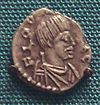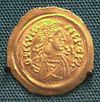- Cleph
-
Cleph (also Clef, Clepho, or Kleph) was king of the Lombards from 572 or 573 to 574 or 575.
He succeeded Alboin, to whom he was not related by blood. He was a violent and terrifying figure to the Romans and Byzantines struggling to maintain control of the peninsula. He extended Lombard dominion over all of northern Italy, finishing the conquest of Tuscany and bringing Lombard authority to the gates of Ravenna. He was assassinated after an 18-month reign by a young guard, a slave whom he had mistreated. His death was followed by a ten year interregnum, known as the "Rule of the Dukes" because the territorial dukes were supreme. His son, Authari, eventually took the throne in 585.[1]
Regnal titles Preceded by
AlboinKing of the Lombards
572–574Succeeded by
Rule of the DukesNotes
- ^ "German Tribes org Lombard Kings". GermanTribes.org. Archived from the original on 2010-07-18. http://web.archive.org/web/20100718043340/http://www.germantribes.org/tribes/Lombards/Lombard%20Rulers/kingsline.htm. Retrieved 2010-07-18.
Kings of Italy between 476 and 963 Non-dynastic Odoacer (476–493)Ostrogoths Byzantines Justinian I (as Emperor) (553–565)Lombards Alboin (565–572) · Cleph (572–574) · Interregnum (574–584) · Authari (584–590) · Agilulf (590–616) · Adaloald (616–626) · Arioald (626–636) · Rothari (636-652) · Rodoald (652–653) · Aripert I (653–661) · Godepert (661–662) · Perctarit (661–662) · Grimoald (662–671) · Garibald (671) · Perctarit (671–688) · Cunipert (688–689) · Alahis (689) · Cunipert (689–700) · Liutpert (700–702) · Raginpert (701) · Aripert II (702–712) · Ansprand (712) · Liutprand (712–744) · Hildeprand (744) · Ratchis (744–749) · Aistulf (749–756) · Desiderius (756–774)Carolingians Charles I (774–814) · Pepin (781–810) · Bernard (810–818) · Lothair I (818–855) · Louis I (855–875) · Charles II (875–877) · Carloman (877–879) · Charles III (879–887) · Arnulf (896–899) · Ratold (896)Non-dynastic
(title disputed 887–933)Unruochings: Berengar I (887–924) · Guideschi: Guy (889–894) · Lambert (891–897) · Welfs: Rudolph (922–933) · Bosonids: Louis II (900–905) · Hugh (926–947) · Lothair II (945–950) · Anscarids: Berengar II (950–963) · Adalbert (950–963)Categories:- 574 deaths
- Lombard kings
- 6th-century Italian people
- 6th-century monarchs in Europe
- Murdered monarchs
- European royalty stubs
- Italian nobility stubs
Wikimedia Foundation. 2010.



